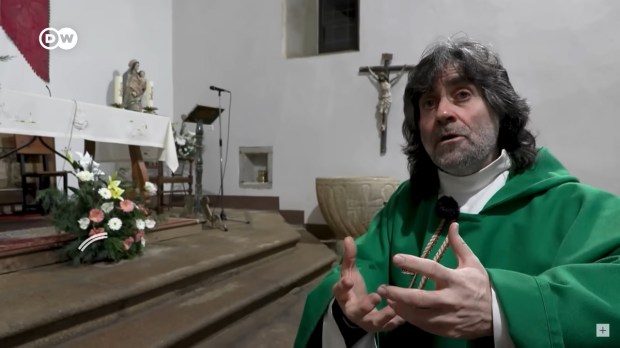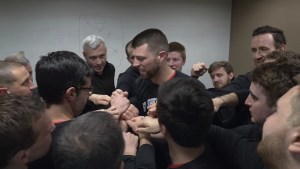Lenten Campaign 2025
This content is free of charge, as are all our articles.
Support us with a donation that is tax-deductible and enable us to continue to reach millions of readers.
Father Teo Nieto carries with him a chain of enormous keys that can open doors to 43 churches in his area. It is far from the latest fashion for Spanish priests, but rather it is the result of dwindling priestly vocations and a declining population that has left Fr. Nieto the sole responder for matters of the faith in the Spanish province of Zamora.
Fr. Nieto was the focus of a recent report from DW News, which followed the multi-parish priest while he traveled the Spanish countryside to minister to his aging flock. He estimates that he drives 50,000 km (31,000 miles) per year, but this is not covered in great distances. Rather, he drives back and forth, to and from the dozens of towns that have become a part of his ministry.
“A car is a necessity for a rural priest,” Fr. Nieto commented as he drove. “Many people in Spain think that the rural areas are less important. After a few years here, someone asked me when I would be promoted, when I would finally be sent to the city. They didn’t understand that I came here because I wanted to be here.”
Fr. Nieto moved to Aliste 29 years ago from the provincial capital of Zamora, after feeling called to take his ministry to the underserved communities of rural Spain. Many of the communities he serves are quite small; for example, one town has just 40 parishioners, a church, and a graveyard. The exterior of the church, shown in the video above, features chipped paint on worn down wood, but Fr. Nieto keeps the interior clean and functional.
With no deacons or helping hands, Fr. Nieto relies on elderly members of his parishes to pick up the slack. When a photographer wanted to take photos of the interior of one of his churches, he entrusted the key to an elderly couple who would chaperone the photo shoot. With 43 parishes to visit each week, Fr. Nieto needs all of his time for his rigorous schedule of driving and ministering to the many communities’ needs.
“The great challenge is that we must restore dignity and quality of life, regardless of age. We also need to show young people that they can have a future here in the countryside,” Fr. Nieto commented on one of his many drives.
Those young people he can find out in the countryside are organized into youth groups. These groups support each other with prayer and social problems, but forming groups also allows Fr. Nieto to meet with more young people at once in his visits. For the young people, it is almost hard to stay, as they naturally want to be with more people in their age group and city life is much more attractive to them.
While the youngsters played keep-away with one of the kids’ phones behind his back, the overburdened yet enthusiastic priest commented:
“I want the young people to feel more rooted, to understand that living in the countryside is worthwhile. Yes, they’ll move away. They need distance and to learn, but maybe they’ll come back one day. To this village or another one.”
Fr. Teo said that while jobs and prospects are few, he still sees opportunities in the countryside. This is what keeps his spirits high as he continues his ministry. The report noted that it is impossible for him to reach all 43 churches for weekly Mass, but he gets some help from other priests. When he cannot find help, he leans on the determined faith of his parishioners, many of whom will travel to the next town over to attend Mass at whichever church he can make it to.
There were no firm solutions presented in the report, although it did mention that a better healthcare program could have the potential to see some growth in the area. Still, it draws attention to the harsh reality that some priests face due to the lack of vocations in the West.



